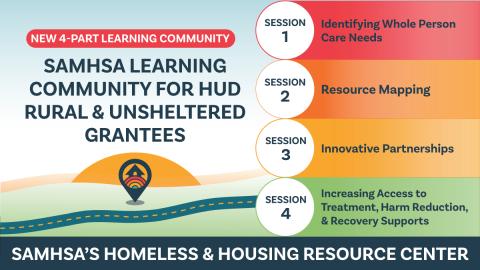Knowledge & Resources
Search and download a library of information and resources for health professionals and housing specialists.
Featured Article

This Learning Community for HUD Rural and Unsheltered grantees will focus on supporting Continuums of Care (CoCs) in understanding and building cross-system partnerships that address the needs of individuals and families impacted by substance use and/or mental disorders among those experiencing unsheltered homelessness and homelessness in rural areas.
Read MoreExplore The Resources
Filter
Clear AllResults
-
Toolkit Coordinating Systems of Care to Provide a Comprehensive Behavioral Health Crisis Response to Individuals Experiencing Homelessness
This brief suggests strategies to enhance crisis care through multilevel coordination and describes practical approaches that systems of care can deploy to strengthen collaboration.
Article New Staff Orientation Guide
This guide compiles introductory resources offered by HHRC into an orientation guide for new professionals. These resources provide introductions to substance use, serious mental illness, achieving and maintaining housing, and treatment and engagement models.
Fact Sheet Promoting Self Care and Resilience Among Supervisees: Infographic
This infographic highlights best practices in promoting self-care and resilience among housing and health professionals.
-
Toolkit Building Resiliency: A Guide for Supervisors of Housing and Health Professionals
This guide is designed to help supervisors identify approaches for the prevention and intervention of secondary traumatic stress, compassion fatigue, and burnout among staff; enhance staff resiliency; support and celebrate health and well-being; and explore policies, procedures, and activities to promote organizational wellness and well-being.
-
Toolkit Whole-Person Care for People Experiencing Homelessness and Opioid Use Disorder: Toolkit Part 2
This guide focuses on understanding the neurobiology of opioid use disorder (OUD) and the treatment and recovery pathways for OUD. The guide covers best practices for referrals and warm handoffs, as well as assistance in meeting basic needs such as income, food, and mainstream benefits.